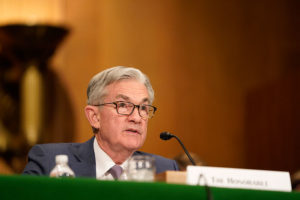
Chair Powell presents the Monetary Policy Report to the Senate Committee on Banking, Housing, and Urban Affairs, February 12, 2020.
Has the Federal Reserve set itself up for failure on inflation? It sure seems that way according to Colby Smith and Caitlin Gilbert writing in the Financial Times:
The Federal Reserve will fail to control inflation if it delivers only six quarter-point rate rises this year as markets expect, according to almost half of leading academics polled by the Financial Times.
The survey, conducted by the Initiative on Global Markets at the University of Chicago Booth School of Business in partnership with the FT, suggests the US central bank risks moving too slowly in shifting monetary policy away from its ultra-loose settings in place since the start of the pandemic. The outlook has now been significantly clouded by the Russian invasion of Ukraine.
A majority of the 45 economists polled said the federal funds rate will increase to a minimum 1.5 per cent by the end of the year — a jump that translates to at least six quarter-point rate rises, given low expectations that the Fed will make an aggressive half-point increase at its policy meeting in March.
That compares to 42 per cent who predict the Fed will deliver only four or five quarter-point adjustments this year, well short of what most of the respondents believe is necessary to damp demand and tame inflation.
Just over 40 per cent of the economists warned that lifting the federal funds rate by 1.5 percentage points this year is “too little too late”. However, 39 per cent said raising interest rates by that magnitude was “just about right” without severely slowing the economy. Only 5 per cent worried it would cause a recession, with the housing market and business investment taking the largest hits.
“They let themselves get a bit more behind the curve than they should have,” said Alan Blinder, a former Fed vice-chair. “That implies going faster or more aggressively than you would have if you started earlier.”
Read more here.
